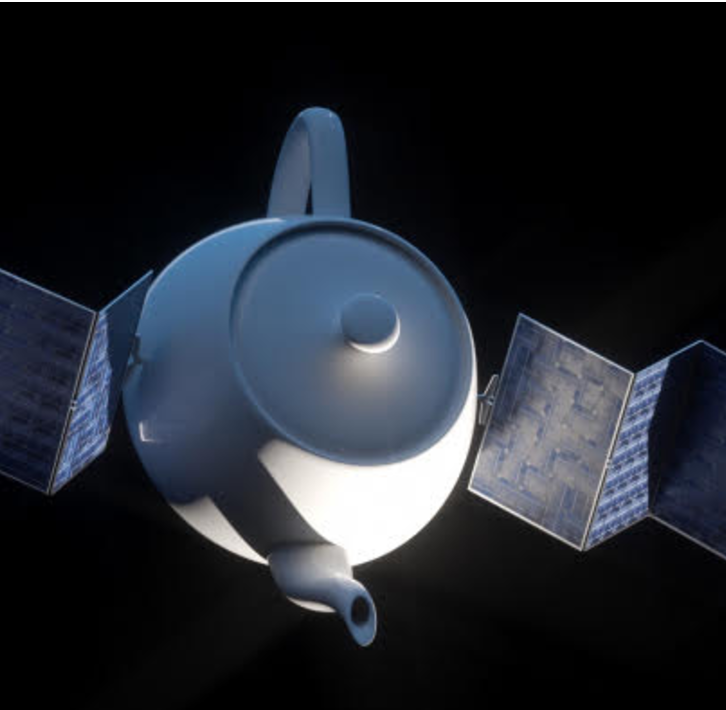The Theological Implications of the WooDyne Orbiting Teapot: A Disproof of the Non-Existence of God?

“If I were to suggest that between the Earth and Mars there is a china teapot revolving about the sun in an elliptical orbit, nobody would be able to disprove my assertion provided I were careful to add that the teapot is too small to be revealed even by our most powerful telescopes. But if I were to go on to say that, since my assertion cannot be disproved, it is an intolerable presumption on the part of human reason to doubt it, I should rightly be thought to be talking nonsense. If, however, the existence of such a teapot were affirmed in ancient books, taught as the sacred truth every Sunday, and instilled into the minds of children at school, hesitation to believe in its existence would become a mark of eccentricity and entitle the doubter to the attentions of the psychiatrist in an enlightened age or of the Inquisitor in an earlier time.” Bertrand Russell, 1952
My young artist friend in Portland, Oregon, Zack Dougherty, proposes to one-up the venerable British philosopher’s argument by putting the teapot onto a rocket and sending it into outer space. He intends to set up a Kickstarter campaign to fund the launch in the name of WooDyne Aerospace Corporation.
If the existence of God is an assertion that cannot be disproved, Russell argued, that hardly proves that God exists. If a teapot in space is an assertion that cannot be disproved, that hardly proves that it exists. But if we look at a teapot satellite being launched into space, we have the empirical evidence that we need to affirm its existence. And if we look into space, recognizing its totality as one and the same with God, a disproof of God’s nonexistence becomes pointless.
When I was candidating for ordination in the United Church of Christ in 1980, two of the five members of the examining committee voted against me. They concluded I was out of doctrinal bounds for expressing my beliefs that God and the universe are one and that the resurrection of the Christ was mythological. At the time, I agreed with them. I thought of myself as an unorthodox Christian. But through deeper study over the decades, I’ve concluded otherwise. If I was conversing with that committee today, I would quote the mystics of the church over the last 2,000 years who were able to express beliefs like mine in the language of orthodoxy. I have discovered that there is almost nothing new about my home-grown theology. Bishop Nicolas of Cusa in the 15th century called God “Posse-Est” – “Can-Is” – the essence of reality itself. In the 14th century, Konrad of Megenburg, a German scholar and priest, expressed the idea that God could be known equally well through the “book of Nature” and the “book of Scripture”. Origen, the third century theologian, wrote that if a scripture passage contradicted common sense, it should be understood allegorically, not literally. Were I to be examined today by that same ordination committee, might all five members vote in my favor? (I’m pretty sure that at least one or two members of the committee voted in my favor simply because I was working for a large, wealthy church that might have reduced its pledge to the denomination had they not approved me. But I don’t feel too badly about that fudge, because there is historical precedent for it. Bishop Cusa’s edgy theology might well have brought him before the Inquisition had he not been the Pope’s political point-man in Germany at the time.)
I hope that the WooDyne Teapot Satellite makes it into space, in order to stimulate a public conversation about the natural nature of God. As Russell’s teapot moves from the invisible to the visible, so may our concept of God move from empirically-unsupportable supernaturalism to the undeniable reality of reality itself.
If Zack gets his way, someday we’ll be able to gaze into the heavens and know for certain that out there is a teapot, whirling in orbit around the sun. It will be a tiny white speck, too small to see, but big enough to imagine – inspiring us to holy awe at the divinity of the universe.
About the Author Jim Burklo
Website: MINDFULCHRISTIANITY.ORG Weblog: MUSINGS Follow me on twitter: @jtburklo
See the GUIDE to my articles and books
Associate Dean of Religious Life, University of Southern California

